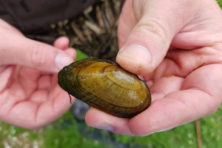Imperiled Native Mussels of Wisconsin
- Share
- Tweet
- Pin
- Share

When we hear the term “endangered species,” mussels are not likely to be the first image that springs to mind, but native mussels are among the most imperiled animals. More than half of Wisconsin’s 51 native mussel species (also known as clams) are listed as species of greatest conservation need.
On Aug. 1 at 7 pm, Lisie Kitchel of the Wisconsin Department of Natural Resources will present “Wisconsin’s Native Mussels” at the Baileys Harbor Town Hall. The program is part of The Ridges Sanctuary’s Lake Lessons series.
Mussels are found in shallow areas of lakes and rivers, but the vast majority of species are found in rivers where mussels find the flowing water that delivers the food and oxygen they need to survive. Threats like habitat alteration and the presence of invasive mussels (zebra mussels) pose major threats to their existence.
Although overharvesting, water pollution and dams that block flowing water led to their decline in the 20th century, Kitchel is encouraged that mussel populations are increasing. This reversal can be attributed to protections afforded by the state and federal endangered species acts, and also to improved water quality since the 1972 Clean Water Act.
“And now the mussel’s role in ecosystems is starting to shine as scientists learn more about these animals,” Kitchel says. “Mussels are our freshwater filters. A single mussel can filter a gallon or more of water a day, removing sediment and nutrients that can fuel algae blooms, as well as pesticides and heavy metals like mercury that can build up in fish and wildlife and the people who eat them.”
Lake Lessons are free and open to the public. Donations are welcome. For more information, visit RidgesSanctuary.org.

